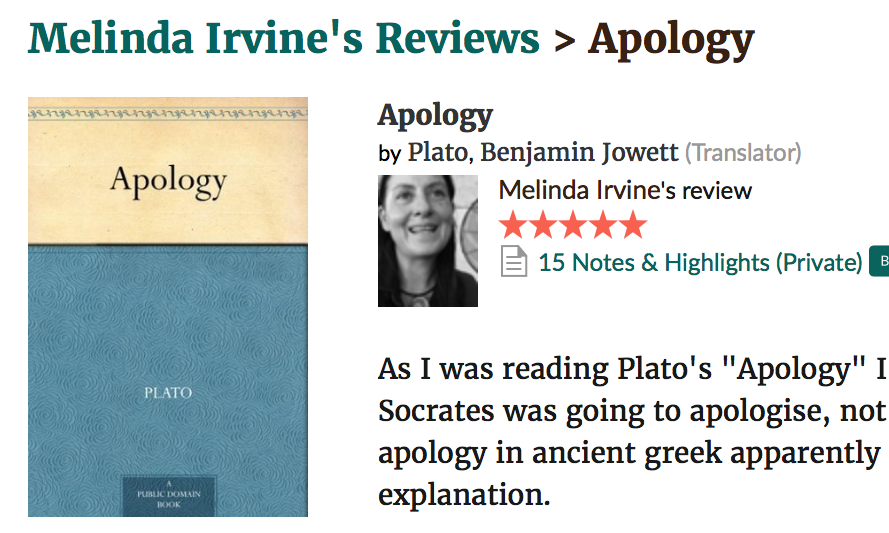Your cart is currently empty!
Since recommencing my freelance copywriting business back in January I’ve had writing assignments on a wide range of topics, but last week I had to write a short piece about the reading habits of extraordinarily successful people. It was a really enjoyable subject to write about and I realised I’d been neglecting my own reading. Having created a “books” category here on the blog which I’ve barely used I felt rather inspired after learning about the entire section Bill Gates devotes to his personal reading list on his blog.
Naturally I immediately went to my Kindle App and finally read Plato’s Apology and picked up the quill to write a review on Goodreads (which I’m sharing with you below). I’m actually an active university student allegedly completing a Bachelor Arts (Philosophy) but I keep deferring every semester. One of my biggest fears is writing the essays (actually it’s verbalising my thoughts and opinions) so I thought reading this short (but amazing) book and reviewing it would be a small step in a good direction for expanding both my reading and writing practice.
 Apology by Plato
Apology by Plato
My rating: 5 of 5 stars
As I was reading Plato’s “Apology” I kept wondering when Socrates was going to apologise, not realising that the word apology in ancient greek apparently is more about an explanation.
The Apology is a play set in a courtroom in Ancient Greece. The Philosopher Socrates is on trial for corrupting the youth, not believing in God as well as being ‘a curious person’. In the play Socrates addresses the court, defending himself and his integrity.
What I really enjoyed about the book (translated from Ancient Greek by Benjamin Jowett in 1871) was the way Plato informs the reader about the other people in the room even though they don’t have any direct dialogue. Socrates is the only character in the play who speaks, yet we learn of the noise in the court, the constant interruptions and even the names of the people in attendance through his speech rather than side notes or stage directions.
As readers we can learn a lot about Ancient Greece culture and religion (especially if you have already read Homer’s Iliad). Socrates refers often to the Greek heroes in Homer’s epic and uses Achilles as an example of integrity and courage. When I read the Iliad I actually thought the real hero of the book was Hector, so I found it interesting that the deeds of Achilles were obviously so well respected in Ancient Greece they were used as self-evidence truths in a courtroom.
Being one of Plato’s earliest dialogues we are introduced to Socratic logic as well as Socrates overarching ethics and values. Socrates, despite being sentenced to death remains calm (refusing to lower his standards) claiming in pure truth and faith, that punishing him with death would be a crime far greater than actually being killed himself.
It seems incredible that a text written around 2,500 years ago could be so easy to read and I look forward to reading it again and again.
© 2017 Melinda J. Irvine
- Daily Prompt: Quill
- I’m part of Post A Day 2017
Discover more from Melinda J. Irvine
Subscribe to get the latest posts to your email.






2 responses to “Reading Plato”
I teach a course with this text and the students love it so much
it’s so wonderful there is so much to learn in every reading.